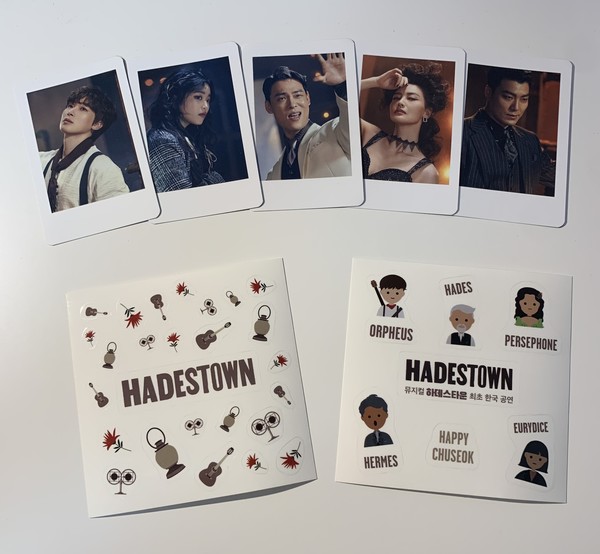Finding deeper meaning in a Greek tragedy


THE CLASSIC Greek tragedy of Orpheus and Eurydice has been spun on its head—in the musical Hadestown, Anaïs Mitchell reinterprets the world of the gods into a satire against capitalistic greed during the Great Depression. The underworld has been transformed into a grimy factory, with Hades as its demanding overseer. Eurydice no longer dies from a snake bite but is drawn to the underworld by the promises of financial independence. Persephone is no longer afraid to show opposition to her husband’s cruelty as Mitchell makes the relationships in the musical more complex and realistic, adding a new layer of depth to the original myth. The two married couples go on a journey, rediscovering their love in dire situations. The musical illustrates a story where Orpheus and Eurydice’s hope and perseverance overcome the hardships of a tragic ending.
Entering the world of Hadestown
To enter the world of Hadestown, one must simply step into the LG Art Center near Yeoksam station, where the stage transports the audience to the “underworld.” The stage design itself closely follows the original Broadway production, with a revolving circular center, a vintage staircase and balcony for the gods Hades and Persephone, and two corners of the stage for a small instrumental ensemble. Rachel Chavkin, the producer of the original Broadway show expressed that the revolving stage center is supposed to be a “treadmill of some kind[1],” representing the harsh cyclical life many laborers suffered from during the Great Depression. Although Hadestown’s score incorporates various genres of music such as folk, pop, Dixieland, and rhythmic work shanties. According to Rollingstone, Mitchell’s decision to place the Greek myth within the setting of the Great Depression era allowed her to incorporate a wide swatch of American music.
A feminist take on the classic tale
Though the original story of Orpheus and Eurydice is narrated in a male-centric perspective, using female characters as damsels only to exalt the achievements of men, Mitchell focused more on emphasizing the independent nature of the female characters in Hadestown: Eurydice and Persephone are not simply muses nor pretty “flowers” that their husbands can keep forever. As the original myth did not give Eurydice a distinct character, Mitchell had the freedom to mold Eurydice into someone capable of making bold, independent choices. Unlike the original myth, Eurydice does not die but instead, moves to Hadestown to flee poverty and hunger. Mitchell says in an interview with NPR, “Eurydice makes a choice. She chooses the security of Hadestown, which comes with this kind of lifelessness. So she chooses [with] her gut. She chooses her stomach over her heart." Eurydice’s firm belief in her choice contradicts the misogynist expectation that women should only rely on their male partners.
Mitchell also gives Persephone a voice in the musical by adding more depth to her relationship with Hades. Unlike the original myth where Hades had kidnapped Persephone and tricked her into marriage, in Hadestown, Persephone fell in love with Hades and married him out of her own free will. Though their marriage is not perfect, as they constantly fight, Persephone stands her ground. Unlike the original myth, Persephone has the power to express her disapproval, making Hades reflect on his greedy nature and the human rights problems within his factory.
A different cast, a different interpretation
While original Broadway actors like Reeve Carney portrayed the protagonist Orpheus like a young hero with a strong passion (for music and love), Park Kang-hyun shows a “cuter” version in the Korean production of the musical. Park emphasizes Orpheus’ youthfulness and naivete through anxious and restless body movements, squirming whenever faced with an obstacle. For example, when Hermes tells him that Eurydice left him to go to Hadestown, the shock and desperation in his facial expressions make him resemble a lost puppy that is anxious to be reunited with its owner. He also suddenly becomes clingier to Hermes, demanding him for a way to save Eurydice. While Park’s performance exemplifies Orpheus’ love for Eurydice, but the actor’s softer interpretation later inhibited Orpheus from showing his more charismatic side. In “Epic III,” where an empowered and brave Orpheus presents his final song to Hades, Park accentuated fragility and vulnerability, which doesn’t compliment the song’s power that comes from Orpheus’ new-found bravery and mature understanding of love.
Though Park’s Orpheus fell a bit flat in the Korean production, the musical made the characterizations of the Fates infinitely more interesting compared to the original production. The Fates are transformed from graceful ladies that sing soul music to powerful ajummas[2] who are sassy and condescending. Although their ages range from late-twenties to late-thirties, they all wear the same blue turban and flowy chiffon dress with layers to achieve visual uniformity as a vocal trio. The fates’ styling presents the ladies as bold goddesses, accentuating the mean attitude and power they possess as ajummas. When Eurydice is suffering from the cold and hunger of the upper world, the Fates belittle her, and even take away her coat and last candle. As the ajumma interpretation of the Fates is very specific to the Korean context, their new characteristics are more relatable and appealing to a Korean audience.
A predictable, but valuable ending
While the tragic ending is predictable, our narrator Hermes promises the audience they will still “learn a lesson” by the musical’s end. Perhaps, the “lesson” that he was referring to was that it is not the destination that matters, but the journey that the characters take to get there. In the last act, Hades finally agrees to let Orpheus and Eurydice leave the underworld, but on one condition—Orpheus should not look back at Eurydice as they leave. If he does so, doubting her devotion, Eurydice will be condemned to stay in the underworld forever. Overcome with doubt, Orpheus traps Eurydice with a single look. Though the ending is certainly not happy, what really mattered was Eurydice’s journey and transformation as a character. Throughout the musical, Eurydice emphasizes her individuality such as in tracks where she sings “All I’ve ever known is how to hold my own,” expressing how she has been surviving alone in a cruel world. By showing Eurydice’s vibrant confidence and boldness during harsh situations, the musical suggests that the audience should continue to move forward in life even when they are faced with doubt. The musical demonstrates that when one is in a manipulative relationship, they should try to move on and do what is best for themselves, not others.
Another lesson that the audience can take, despite the tragic ending, is that failure is not the only thing that matters—what matters is that you tried. Orpheus’ flaws are apparent from the very beginning, as his naïve passion for music often gets in the way of his perception of reality. However, as Orpheus overcomes his flaws and finally takes action to save Eurydice from Hadestown, Orpheus’ bravery and love for Eurydice are apparent. In the ending track “We Raise Our Cups,” the entire cast celebrates Orpheus’ bravery despite how he failed his mission and lost Eurydice to Hadestown. The entire cast encouraged the audience to stand up and sing, “We raise 'em high and drink 'em dry to Orpheus and all of us.” It felt rather bittersweet; while I did not experience a stereotypical happy ending, it was nice to feel connected with the other audience members and the cast through our remorse.
* * *
Hadestown changes the characters’ personalities and relationships, exhibiting their perseverance, love, and dedication. As a result, the musical urges us to fall in love with the characters and their journeys. We enter Hadestown for a mythical experience, and the musical does offer a magical evening with beautiful music and dance, but we also absorb messages that evoke change to our strained, contemporary culture. The audience accompanied Orpheus and Euridice find love, survive, and eventually see failure in 1920s-1930s America, but they understand that the tragic ending is telling us to continue trying as that journey itself is meaningful and beautiful.
[1] Theatermania YouTube channel
[2] Ajumma: A middle-aged woman in Korea who is often stereotypically portrayed as mean, nosy, and condescending.
Period: 2021. 09. 07 (Tue.)-2022. 02. 27 (Sun.)
Hours: Tue.-Fri. 14:00, 19:00
No performances on Mondays
Ticket fee: Ranges between ₩46,500-₩150,000
Location: Seoul, LG Art Center

